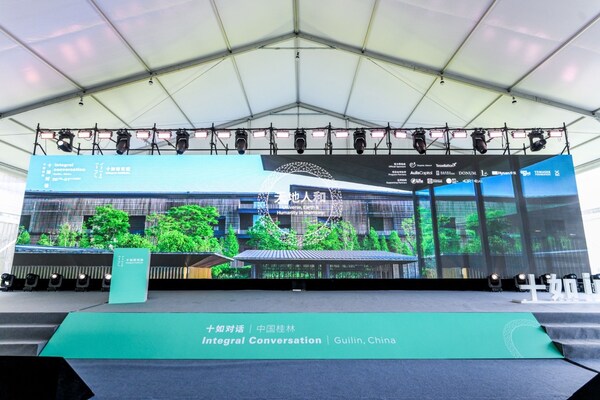Science
Global Leaders Unite to Shape Sustainable Future in Guilin

The 2025 Integral Conversation, hosted by the Integral Institute, successfully concluded in Guilin, China from October 30 to November 1, 2025. The three-day event, themed “Universe, Earth & Humanity in Harmony: Designing Systems for a Balanced Future,” brought together nearly 300 leaders and experts from various sectors, including government, business, academia, and culture. The discussions focused on fostering collaboration between nature and industry to create sustainable systems that benefit both.
Key Themes and Discussions
This year’s dialogue featured four thematic forums: Agriculture, Technology, Industry, and Education. Each forum aimed to explore sustainability through diverse perspectives and cross-sector collaboration. At the opening ceremony, Edgar Tung, Council Member of the Integral Institute and CEO of Tessellation Group, emphasized the need to redefine progress by highlighting balance and interconnection. He stated, “True sustainability is about restoring ecosystems, supporting human well-being, and transforming industries to be resilient for the long haul.”
A Fireside Chat moderated by Professor Wang Tianyi, another Council Member, featured insights from Daniel Zhang, Managing Partner of Firstlight Capital. Zhang discussed the parallels between natural and business ecosystems, underscoring that a successful business ecosystem must reflect nature’s principles, such as diversity and adaptability. He noted that exceptional leaders guide their teams with confidence during uncertain times.
On October 31, Teresa Yang, Vice Chairman of Esquel Group, illustrated how the concept of “Integral” embodies sustainability in everyday operations. The site of the event was recently recognized as one of China’s first certified Zero-Carbon Parks. Yang remarked, “Sustainability is not a goal we set for the future, but a commitment we live every day.” She stressed that true harmony between industry and nature can only be achieved through consistent action.
Prominent Voices and Future Directions
Sun Huan Zhi, Vice Mayor of the Guilin Municipal People’s Government, praised the Integral Institute’s efforts to promote sustainability dialogue. He remarked, “Integral has set a strong example for Guilin’s green transformation,” aligning with the city’s goal of becoming a world-class tourism destination while exploring green industrial growth.
The event featured a keynote address by Irene Lee, Chairman of Hysan Development Company Limited, who discussed the balance between heritage and innovation in urban design. Moderated by Professor Christine Loh, Lee emphasized that “True urban development lies in respecting the past while shaping a connected, sustainable future.”
The “CEO Plenary” gathered leaders from technology, finance, and culture to explore how harmony can drive sustainable transformation. Discussions highlighted that aligning commercial success with social and environmental value is crucial for achieving long-term sustainability.
Subsequent forums delved deeper into specific sectors. In the “Regenerative Land: Where Vineyards Meet Verse” session, Dan Fishman, Vice President of Winemaking and Vineyards at The Donum Estate, discussed vineyard management’s role in promoting harmony between agriculture and nature. The Donum Estate integrates fine winemaking, sustainable agriculture, and art to restore biodiversity.
In a session titled “Fashioning Harmony: From Growth to Balance,” Christiane Dolva, Head of Innovation at the H&M Foundation, emphasized the need for balance between innovation and reality in the fashion industry. She stated, “Achieving a climate-neutral industry requires finding balance between innovation and reality, speed and patience.”
Moreover, in the “Technology with Purpose: Innovation Rooted in Humanity” forum, Heng Li Lang, Head of Climate & Liveability at Temasek Foundation, explained the Foundation’s “triple bottom line” approach to climate innovation, which aims to balance ecological integrity, social well-being, and economic viability. She asserted, “A truly sustainable solution must be environmentally sound, socially meaningful, and economically effective.”
In the educational sphere, Lillian Kiang, CEO of Bei Shan Tang Foundation, discussed redefining learning through emotional health and well-being, asserting that prioritizing emotional well-being does not diminish achievement but enhances resilience in students.
In his closing remarks, Professor Hau Lee, Council Chair of the Integral Institute, remarked that the Integral Conversation serves as a platform for intellectual exchange and action. He called for continued efforts to seek harmony and inclusiveness amid differing perspectives to build a resilient future.
Now in its twelfth year, the Integral Conversation has convened over 3,000 representatives from more than 100 industries worldwide since its inception in 2014. The event continues to foster dialogue and collaboration on sustainable development, ensuring that global leaders remain united in their efforts to promote a balanced future.
The Integral Institute, the organizing body of the event, is a non-profit organization focused on exploring sustainability at various levels. It aims to cultivate transformative models and practices, emphasizing the interconnectedness of social, economic, and environmental issues. Through collaboration and knowledge exchange, the Integral Institute drives meaningful change toward a sustainable future.
-

 World5 months ago
World5 months agoSouth Korea’s Foreign Minister Cho Hyun to Visit China This Week
-

 Business5 months ago
Business5 months agoStarling Bank Plans Secondary Share Sale, Targeting $5.4 Billion Valuation
-

 Top Stories5 months ago
Top Stories5 months agoMunsang College Celebrates 100 Years with Grand Ceremony
-

 World5 months ago
World5 months agoPAS Aims to Expand Parliamentary Influence in Upcoming Election
-

 Business7 months ago
Business7 months agoKenvue Dismisses CEO Thibaut Mongon as Strategic Review Advances
-

 Lifestyle6 months ago
Lifestyle6 months agoHumanism Camp Engages 250 Youths in Summer Fest 2025
-

 Sports6 months ago
Sports6 months agoDe Minaur Triumphs at Washington Open After Thrilling Comeback
-

 Sports7 months ago
Sports7 months agoTupou and Daugunu Join First Nations Squad for Lions Clash
-

 Top Stories7 months ago
Top Stories7 months agoColombian Senator Miguel Uribe Shows Signs of Recovery After Attack
-

 World7 months ago
World7 months agoASEAN Gears Up for Historic Joint Meeting of Foreign and Economic Ministers
-

 Health6 months ago
Health6 months agoNew Study Challenges Assumptions About Aging and Inflammation
-

 Business7 months ago
Business7 months agoOil Prices Surge Following New EU Sanctions on Russia









